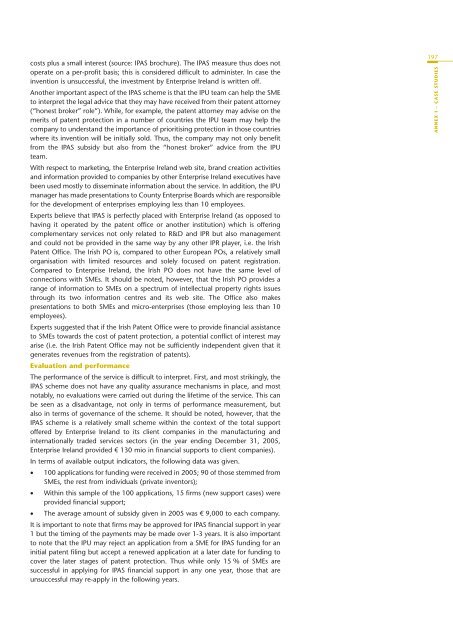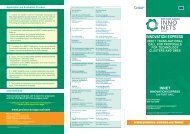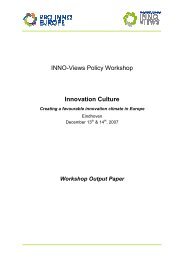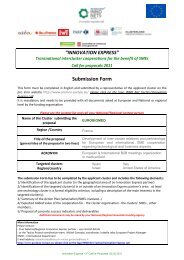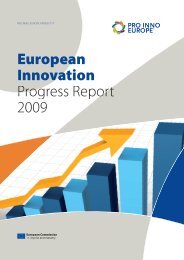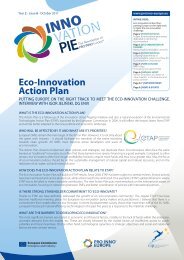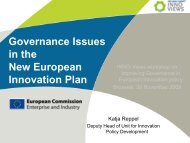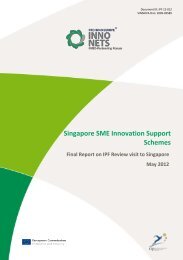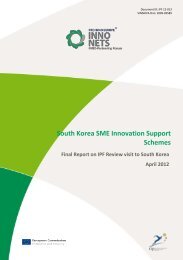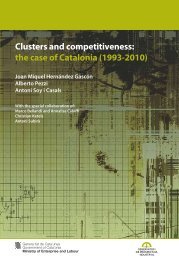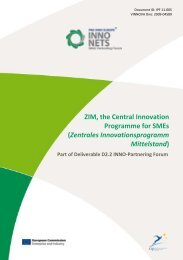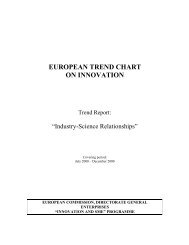Benchmarking National - PRO INNO Europe
Benchmarking National - PRO INNO Europe
Benchmarking National - PRO INNO Europe
You also want an ePaper? Increase the reach of your titles
YUMPU automatically turns print PDFs into web optimized ePapers that Google loves.
costs plus a small interest (source: IPAS brochure). The IPAS measure thus does not<br />
operate on a per-profit basis; this is considered difficult to administer. In case the<br />
invention is unsuccessful, the investment by Enterprise Ireland is written off.<br />
Another important aspect of the IPAS scheme is that the IPU team can help the SME<br />
to interpret the legal advice that they may have received from their patent attorney<br />
(“honest broker” role”). While, for example, the patent attorney may advise on the<br />
merits of patent protection in a number of countries the IPU team may help the<br />
company to understand the importance of prioritising protection in those countries<br />
where its invention will be initially sold. Thus, the company may not only benefit<br />
from the IPAS subsidy but also from the “honest broker” advice from the IPU<br />
team.<br />
With respect to marketing, the Enterprise Ireland web site, brand creation activities<br />
and information provided to companies by other Enterprise Ireland executives have<br />
been used mostly to disseminate information about the service. In addition, the IPU<br />
manager has made presentations to County Enterprise Boards which are responsible<br />
for the development of enterprises employing less than 10 employees.<br />
Experts believe that IPAS is perfectly placed with Enterprise Ireland (as opposed to<br />
having it operated by the patent office or another institution) which is offering<br />
complementary services not only related to R&D and IPR but also management<br />
and could not be provided in the same way by any other IPR player, i.e. the Irish<br />
Patent Office. The Irish PO is, compared to other <strong>Europe</strong>an POs, a relatively small<br />
organisation with limited resources and solely focused on patent registration.<br />
Compared to Enterprise Ireland, the Irish PO does not have the same level of<br />
connections with SMEs. It should be noted, however, that the Irish PO provides a<br />
range of information to SMEs on a spectrum of intellectual property rights issues<br />
through its two information centres and its web site. The Office also makes<br />
presentations to both SMEs and micro-enterprises (those employing less than 10<br />
employees).<br />
Experts suggested that if the Irish Patent Office were to provide financial assistance<br />
to SMEs towards the cost of patent protection, a potential conflict of interest may<br />
arise (i.e. the Irish Patent Office may not be sufficiently independent given that it<br />
generates revenues from the registration of patents).<br />
Evaluation and performance<br />
The performance of the service is difficult to interpret. First, and most strikingly, the<br />
IPAS scheme does not have any quality assurance mechanisms in place, and most<br />
notably, no evaluations were carried out during the lifetime of the service. This can<br />
be seen as a disadvantage, not only in terms of performance measurement, but<br />
also in terms of governance of the scheme. It should be noted, however, that the<br />
IPAS scheme is a relatively small scheme within the context of the total support<br />
offered by Enterprise Ireland to its client companies in the manufacturing and<br />
internationally traded services sectors (in the year ending December 31, 2005,<br />
Enterprise Ireland provided € 130 mio in financial supports to client companies).<br />
In terms of available output indicators, the following data was given.<br />
� 100 applications for funding were received in 2005; 90 of those stemmed from<br />
SMEs, the rest from individuals (private inventors);<br />
� Within this sample of the 100 applications, 15 firms (new support cases) were<br />
provided financial support;<br />
� The average amount of subsidy given in 2005 was € 9,000 to each company.<br />
It is important to note that firms may be approved for IPAS financial support in year<br />
1 but the timing of the payments may be made over 1-3 years. It is also important<br />
to note that the IPU may reject an application from a SME for IPAS funding for an<br />
initial patent filing but accept a renewed application at a later date for funding to<br />
cover the later stages of patent protection. Thus while only 15 % of SMEs are<br />
successful in applying for IPAS financial support in any one year, those that are<br />
unsuccessful may re-apply in the following years.<br />
197<br />
ANNEX I – CASE STUDIES


